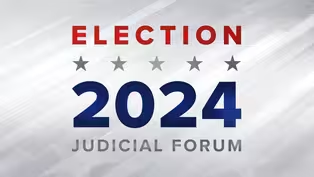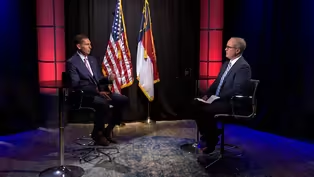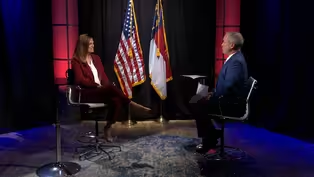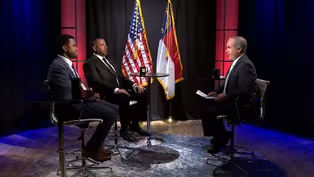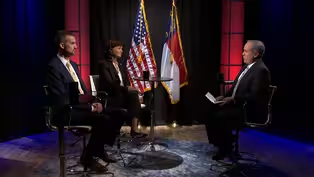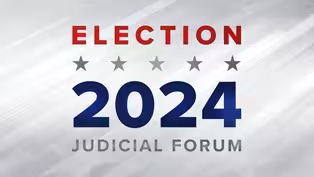
NC Court of Appeals Seat 12: Tom Murry (R) & Carolyn J. Thompson (D)
Season 2024 Episode 3 | 12m 56sVideo has Closed Captions
NC Court of Appeals seat 12 candidates Tom Murry (R) & Carolyn J. Thompson (D) discuss the position.
Candidates Tom Murry (Republican) & Carolyn Jennings Thompson (Democrat) discuss their background and why they're running for NC's Court of Appeals seat 12 with PBS NC's Kelly McCullen. These interviews are a partnership with the NC Bar Association.
Problems playing video? | Closed Captioning Feedback
Problems playing video? | Closed Captioning Feedback
Election is a local public television program presented by PBS NC
The 2024 Judicial Candidates Forum is made possible by a partnership between PBS North Carolina and the North Carolina Bar Association.

NC Court of Appeals Seat 12: Tom Murry (R) & Carolyn J. Thompson (D)
Season 2024 Episode 3 | 12m 56sVideo has Closed Captions
Candidates Tom Murry (Republican) & Carolyn Jennings Thompson (Democrat) discuss their background and why they're running for NC's Court of Appeals seat 12 with PBS NC's Kelly McCullen. These interviews are a partnership with the NC Bar Association.
Problems playing video? | Closed Captioning Feedback
How to Watch Election
Election is available to stream on pbs.org and the free PBS App, available on iPhone, Apple TV, Android TV, Android smartphones, Amazon Fire TV, Amazon Fire Tablet, Roku, Samsung Smart TV, and Vizio.
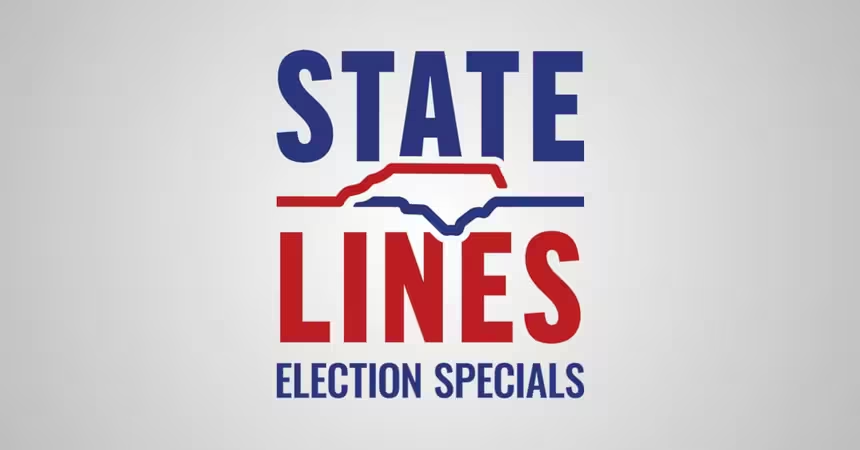
Council of State Candidate Interviews
During major election cycles, State Lines host Kelly McCullen sits down for in-depth conversations with candidates running for Governor and Council of State positions.Providing Support for PBS.org
Learn Moreabout PBS online sponsorshipMore from This Collection
2024 NC Judicial Forum
2024 NC Court of Appeals Seat 15 & Supreme Court Seat Candidates
Video has Closed Captions
St. 15: Chris Freeman (R) & Martin Moore (D). Supreme C.: Jefferson Griffin (R) & Allison Riggs (D). (26m 46s)
NC Supreme Court Candidate Jefferson Griffin (R)
Video has Closed Captions
NC Supreme Court candidate Jefferson Griffin (R) discusses the position. (6m 43s)
NC Supreme Court Candidate Allison Riggs (D)
Video has Closed Captions
NC Supreme Court candidate Allison Riggs (D) discusses the position. (6m 41s)
NC Court of Appeals Seat 15: Chris Freeman (R) & Martin Moore (D)
Video has Closed Captions
NC Court of Appeals seat 15 candidates Chris Freeman (R) & Martin Moore (D) discuss the position. (12m 59s)
NC Court of Appeals Seat 14: Ed Eldred (D) & Valerie Zachary (R)
Video has Closed Captions
NC Court of Appeals seat 14 candidates Ed Eldred (D) & Valerie Zachary (R) discuss the position. (12m 20s)
2024 NC Court of Appeals Seats 12 & 14 Candidates
Video has Closed Captions
Seat 12: Thomas Murry (R) & Carolyn J. Thompson (D). Seat 14: Ed Eldred (D) & Valerie Zachary (R). (26m 46s)
Providing Support for PBS.org
Learn Moreabout PBS online sponsorship- [Kelly] The 2024 Judicial Candidates Forum is made possible by a partnership between PBS North Carolina and the North Carolina Bar Association.
[upbeat music] Joining us are the nominees for North Carolina's Court of Appeals Seat Number 12, as it's called, Democratic candidate, Carolyn Jennings Thompson and Republican candidate, Thomas Murry.
Hello to both of you.
Thank you for taking time out of your busy schedule.
- Thank you.
- Same here.
- Well, we flipped a coin in the green room to determine who would speak first and who would've closing arguments and, by virtue of the coin flip, Ms. Thompson, the incumbent, you will go first.
Tell us about yourself.
Why you're running, your background, and we'll take it from there.
- Well, first, thank you so much for this opportunity to educate the voters about the candidates for the seat.
I am Carolyn Thompson.
I currently serve the state on the North Carolina Court of Appeals.
But just to give you some background, I am was born and raised in a rural town by parents who instilled in me very early the importance of hard work and earning my way.
And the importance of understanding that to whom much is given, much is required.
And I think that has contributed so much to my 27 years of experience and also the fight to continue to stay in the judicial system where it impacts lives and generations to come.
I have 27 years prior being a district court judge, superior court judge, serving on the industrial commission as a deputy commissioner, trial attorney for 13 years before becoming a judicial official for the state.
I'm a mom, my First Sergeant John Thompson, and I have a blended family of five adult kids and I hold honor to being called nana to six beautiful grandchildren.
And we finally got our boy, Jeremiah.
He's 18 months old.
And I look forward to continuing to answer your questions and educate our voters.
- Well, thank you for being here.
Mr. Murry, tell us about yourself.
- Well, over the past 23 years, I've had the opportunity to help folks in many different capacities.
I started my career as a local community pharmacist.
I worked with a lot of small business pharmacy owners and that led me to law school with all the different regulatory issues.
And during law school, I got asked by folks in my neighborhood to run for my town council.
And so I ran for the town council, got elected when I was 28 years old, had a 1-year-old and a stroller, asking people to vote for me.
After getting reelected, I got asked to run for the state legislature, served a couple terms in the legislature.
While I was in the legislature, I joined the Army National Guard as a 37-year-old father of three, with my youngest being six months old.
After leaving the legislature, I had the opportunity to serve our Chief Justice as chief legal counsel, worked for the Chief Justice, where we did dramatic reforms on juvenile justice issues.
While I was in that role, I deployed to the Middle East where I got a chance to see what lawlessness and disorder and chaos looks in foreign countries that have never slept under the blanket of police that we've enjoyed our entire lives as Americans.
And after coming back from that deployment, I decided to go back into the trenches as a state prosecutor where I've enjoyed working with local law enforcement on keeping our communities safe.
And I'm running for the court of appeals because I believe I've got the right balance of public and private sector experience that would benefit the court of appeals.
- Ms. Thompson, if you had to name the most important qualification or a few of any judge who serves on our court of appeals, what would those qualifications be?
- Certainly, the first thing that comes to mind is integrity.
That people can trust what you say and what you write and an opinion.
And that understanding that there's a transparency need for our court system so folks are not questioning what exactly is a judge and why should we vote for judges.
I think it's important that we hold true to our oath, that we will uphold the Constitution and our laws of our state, not inconsistent with those of our United States Constitution.
When you speak this truth to the community, to the public, I think people should be able to count on and trust that this judge is gonna do the right thing.
- When you look back at your own professional and personal background, what parts of your experience do you think have really prepared you to serve on the court of appeals?
- Oh, certainly being a trial attorney for 13 years before becoming a judge for 10 years.
Because the first thing I do when I get the record, I look at what happened in the lower courts and having that benefit of being there as a trial attorney, as a trial judge, I can understand where the court process was in that moment.
Before I look at any briefs, you know, the briefs come into us to kind of persuade the judges to rule one way or another.
I take the position that it's important to look at the record first, which prepared me to this place.
- Mr. Murry, qualifications for you, in the general sense, not including yourself, including everyone who serves on the court of appeals as you view it, what are the most important qualifications to take to that role?
- The court of appeals handles a myriad of cases, but half the cases that come to the court of appeals are criminal conviction appeals.
And as a state prosecutor, my advocacy has been affirmed by the court of appeals.
And so I think the experience as a state prosecutor has definitely benefited me, trying cases in front of juries.
Working with local law enforcement on public safety issues is a big part of the importance of the court of appeals.
But I'll say, I truly believe that the court of appeals is just an error correcting court, not a policy court.
And so knowing your lane and understanding the role that the judiciary plays in our balance, in our separation of powers, and I think the judiciary staying independent, being an independent branch of government and restraining our opinions to the issues presented before us is extremely important when you're looking at judicial candidates.
We don't need folks that are gonna legislate from the bench.
We need folks that are gonna defend the Constitution.
As a soldier, I've taken an oath of office to uphold that constitution.
Camouflage does not say I'm a Republican or a Democrat.
And so those values that are instilled in me as a soldier and as a state prosecutor, I believe are key to making sure that the judiciary remains independent and stays in its lane.
- What are your thoughts about independence of the judiciary, in this era, where we can look on the ballot and see who's a Democrat, who's a Republican?
- Well, quite frankly, it's an unfortunate thing that we have to run in partisan races.
I don't get a blue file, I don't get a red file.
I get people's issues.
And because this is often the court of last resort, we are the workhorse of the appellate system.
We get about 90% of the appeals that come from the lower courts.
I don't look at a file and say, "I wonder if they're a Republican," or, "I wonder if they're a Democrat."
If we could just get back to a place where people can trust the judges by seeing the work and having that proven record, I've already authored over 96 opinions in less than a year that impact the entire state.
You should be able to look at a judge's record to see exactly where they stand about upholding the law in the Constitution.
It's not about partisan.
It should not be partisan.
It should in fact be independent.
- For being in that seat, do you feel the pressure of legislators of attorney generals and other elected leaders coming down on the court?
'Cause you do see it sometimes Supreme Courts and courts of appeals, they are referenced and they do make the headlines whether they ask for it or not.
- Well, you have to stay focused.
You stay focused on the job.
And the job is what the people, this is not my seat.
This is a seat that belongs to the people.
The people are expecting me to uphold the law fairly, equally.
It doesn't matter where you come from, where your zip code is, what your zip code is, or your race, or nationality, or your belief system.
It has to be about upholding equally.
If you can't have that expectation from the court, then that's where we are getting into the lane of people not trusting our judicial system as much as they used to.
- Mr. Murry, what come with experience from the general assembly, and you see how the tone is in Raleigh right now, the way people like to do business on both sides of the aisle.
Go a little deeper into that.
How much independence should we expect if people are voting on a partisan basis from a judge?
- Well, I can tell you that the judiciary is an independent branch of government, separate from the executive and legislative branches.
I have the fortunate experience of serving in the legislature where I overrode vetoes by Democrat governors and I overrode vetoes by Republican governor.
And so I think when you look at the issue set and you look at the facts of the case, equal protection under the law means same facts, same law, same outcome.
And that has nothing to do with a partisan bent on any particular issue.
And I can tell you when judges issue rulings based on their partisan leanings, the public trust is undermined.
And I think the independence of the judiciary is something that I learned when I worked for the Chief Justice and we had a myriad of cases that dealt with separation of powers issues, many of which pitted a Republican governor against the Republican legislature.
And I think that's the perfect role for the judiciary is to see, call the issues out based on the Constitution and the plain meaning of the statute.
And that's our role as judges.
- How can a voter know?
Do they pass, they elect judges here and there on a different statewide ballots, but how do they know when their court of appeals is working most effectively, Ms. Thompson?
- I think reviewing the record is where they will find if we are working effectively.
You can see in recent days what we are doing with things like the voter issue and the RFK ruling.
We are point on, we have our pulse on what's happening in the communities and within the state.
People who are engaged and informed and understand the importance of judges will look at the history, the proven record of where the judges stand.
- On that point, how do you see the court of appeals working most effectively in this last minute before we get to closing statements?
- Certainly, I think the most effective thing that the court of appeals can do is issue its decisions in a timely manner.
And I think that there should be strict timelines.
We have strict timelines on litigants and I think the timelines should be strictly enforced on the judges, the panel of judges that sit.
They sit in three judge panels.
We need to issue those opinions in a timely manner so that the public gets the result.
And justice delayed is justice denied.
And I've seen some delays at the court of appeals and I think we can improve the time from oral argument to decision.
- This is a very interesting set of interviews because it's unique for me in that we are in interview format, but we also have opening and closing statements and we open this interview when I'll close 'em with closing statements.
And by virtue of the coin toss, Mr. Murry, you'll have the last word, so you'll have 60 seconds.
Tell us about why you're seeking office and why folks should vote for you.
and why folks should vote for you.
- Well, I'm seeking to retain the seat because I'm already there doing the hard work It's a lot to say about the 27 years of experience of being a trial attorney, a trial judge, and also now holding the seat, doing the work.
Just to kind of piggyback on what Mr. Murry mentioned, we are a hardworking group of judges.
We are 15, we sit in panels of three.
We are turning cases out, but it's expediency over effectiveness.
No, we're not gonna quickly get to a resolution because of a timeline.
We must make sure that we're making the right decisions and having the right outcome in every single case.
And speaking of right, I believe that in this race, I have the right experience to continue to serve the state of North Carolina and would appreciate the support.
- All right, thank you Ms. Thompson.
Mr. Murry, the last minute is yours.
- Thank you, sir.
I really appreciate the North Carolina Bar Association and UNCT for hosting this.
My name's Tom Murry.
I'm running for the North Carolina Court of Appeals Seat 12 and I'm asking for your vote for very simple reasons.
As a state prosecutor, as an army veteran, as a husband and father of three, I think I've gone under the right balance of experience, starting as a local community pharmacist and bringing that healthcare background to the court of appeals where a lot of issues are decided that involve medical issues.
I think I've got the right background experience.
And I'd ask that you support me because local law enforcement is supporting me.
I've been endorsed by two different police organizations that know that I will bring the right skillset to the court of appeals to keep our community safe and defend the Constitution.
- This is Carolyn Thompson, the Democrat incumbent running for the Court of Appeal Seat 12.
Challenger Tom Murry from the GOP side.
Thank you so much for your time in this interview.
And to inform our viewers, because people do care about their judges and who it serves on their courts.
The 2024 Judicial Candidates Forum is made possible by a partnership between PBS North Carolina and the North Carolina Bar Association.

- News and Public Affairs

Top journalists deliver compelling original analysis of the hour's headlines.

- News and Public Affairs

FRONTLINE is investigative journalism that questions, explains and changes our world.
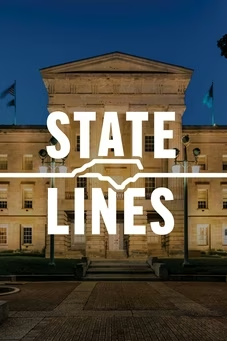











Support for PBS provided by:
Election is a local public television program presented by PBS NC
The 2024 Judicial Candidates Forum is made possible by a partnership between PBS North Carolina and the North Carolina Bar Association.
